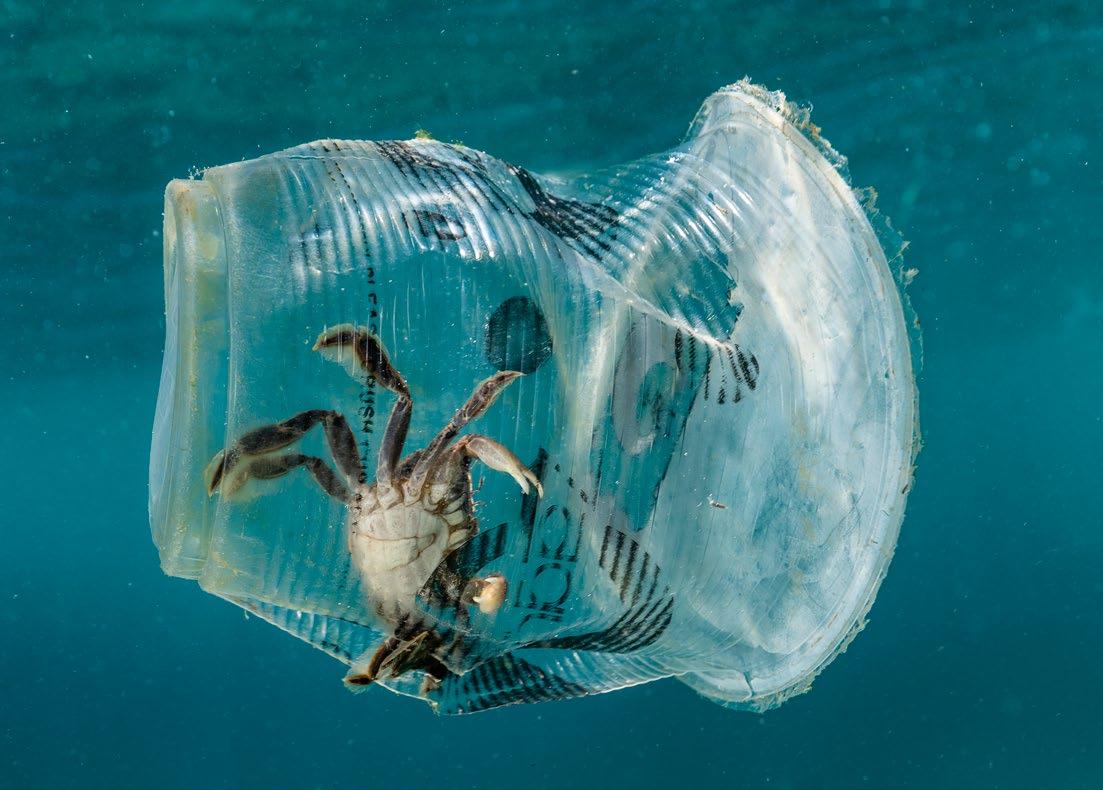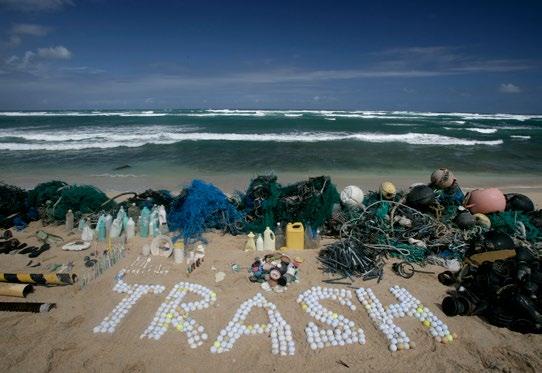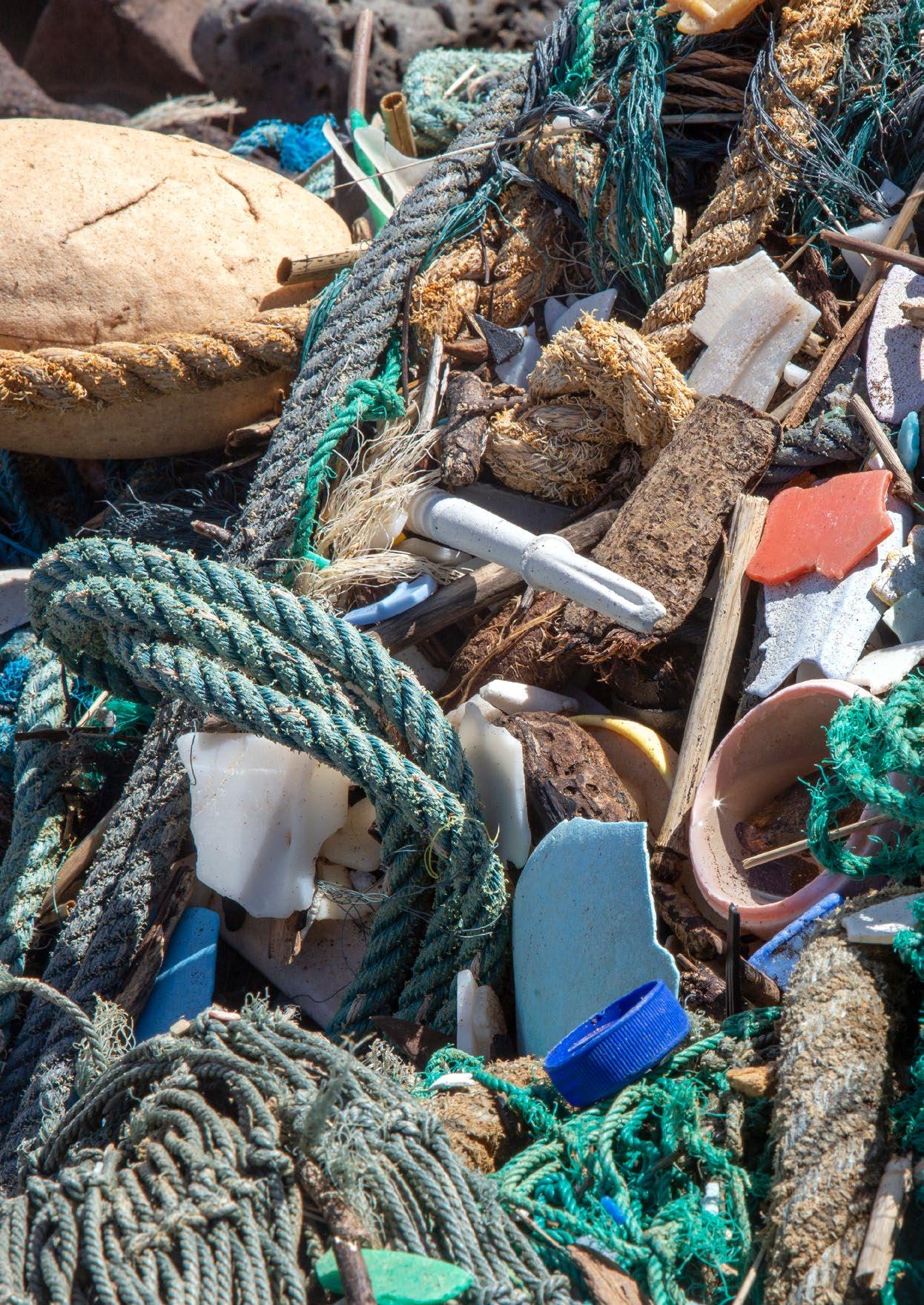
8 minute read
Current regulations
There are a wide variety of policies, regulations and recommendations addressing abandoned, lost and discarded fishing gear at national, regional and international levels. These are often scattered throughout different geographies, conventions and measures, and in some cases are only voluntary. In combination, these existing regulations are either insufficient or there are major gaps in their implementation and enforcement, 66 and are failing to deal with the scale and impacts of ghost fishing and marine debris from fisheries.
Due to the many different characteristics of fisheries, fishing gears and the ecosystems they operate within, specific regulation at both local and regional level is part of the solution to abandoned, lost and discarded fishing gear and its impacts. This requires ecosystem-based, precautionary fisheries management with stringent requirements for banning, restricting or zoning problematic gear types, in conjunction with the protection of vulnerable ecosystems and important areas for wildlife and fish populations.
International agreements and recommendations
UN General Assembly and Sustainable Development Goals
Target 14.1 of the UN’s Sustainable Development Goals requires that countries “by 2025, prevent and significantly reduce marine pollution of all kinds, in particular from land-based activities, including marine debris and nutrient pollution.” 67 The UN General Assembly (UNGA) has also adopted several more specific resolutions on abandoned, lost and discarded fishing gear, in particular UN Resolution 60/31 (2005). The 2018 UNGA Sustainable Fisheries Resolution calls on States and RFMOs, once again, to adopt effective management measures to address the issue of lost or abandoned fishing gear and related marine debris. 68, 69
Plastic Waste in Verde Island, Philippines: A crab was trapped inside a discarded cup in Verde Island Passage, the epicenter of global marine biodiversity, in Batangas City, the Philippines.
UN Fish Stocks Agreement and Regional Fisheries Management Organisations
Existing fisheries regulations at national and regional level take a range of approaches to address the problem of ghost gear, including requirements for gear labelling and lost gear reporting, prohibition on the disposal of materials at sea, management of gear (for example regulating gear types, lengths and mesh sizes, soak times, etc) and area-based management tools (including zoning to separate gear types and protection of vulnerable areas such as seamounts). At a regional level, these are agreed through RFMOs.
The UN Fish Stocks agreement, which is legally binding, requires States and RFMOs to minimize pollution and catches by lost or abandoned gear specifically. 70 Unfortunately, measures taken to date are rather limited. According to a recent review of 19 global and regional bodies, out of 18 categories of measures identified as being potentially useful in addressing abandoned, lost and discarded fishing gear and ghost fishing, nine are not being used by any of them and another five categories are used by only 1 or 2. The Northwest Atlantic Fisheries Organization (NAFO), the North-East Atlantic Fisheries Commission (NEAFC) and the South East Atlantic Fisheries Organisation (SEAFO) have measures which include reporting lost fishing gear and requiring that every reasonable attempt to retrieve lost gear is made. In the case of SEAFO, the fact that only four incidences of lost gear have been reported to the Executive Secretary since the beginning of 2015, 71 given the frequency of lost gear, casts doubts about its implementation. The unabated proliferation of FADs over the last 20 years, most of which end up abandoned or lost, is quite telling of the failure of tuna RFMOs to address the impacts of lost gear.
The UN International Maritime Organization (IMO)
The major legislation governing pollution from ships is the IMO’s International Convention for the Prevention of Pollution from Ships (MARPOL), under which Annex V prohibits the discharge of garbage, including fishing gear, from ships. 72 Exception is made in the case of accidental loss, as long as "all reasonable precautions have been taken to prevent such loss," or discharge of fishing gear for the protection of the marine environment or the safety of the ship or its crew. Any such loss or discharge must be recorded and reported to the flag state of the vessel and coastal state where the incident occurred.
The Marine Environment Protection Committee (MEPC) of the IMO is currently developing an action plan to address marine litter from ships, including through abandonment and loss of fishing gear. This should consider extending IMO's mandatory reporting requirements under MARPOL Annex V to include reporting of discharge or accidental loss of fishing gear from flag States to IMO. 73 Further, the London Convention and Protocol on the Prevention of Marine Pollution by Dumping of Wastes and Other Matter is also considering what actions could be taken, including through enhanced cooperation among UN Agencies and existing agreements to address this serious problem.
The UN Food and Agriculture Organization (FAO)
The FAO has acknowledged the extent of the problem since the 1980s. The 1995 FAO Code of Conduct for Responsible Fisheries 74 requires States to minimise catch by lost or abandoned fishing gear in a number of ways, including:
Environmentally safe fishing gear and techniques Technical measures for gear, methods, zoning, area and seasonal closures Technologies, materials and methods to minimise loss or impacts from lost gear.
The FAO has produced several reports and consultations and concluded the FAO Voluntary Guidelines for the Marking of Fishing Gear, adopted in 2018, aimed at combating, minimising and eliminating abandoned, lost or otherwise discarded fishing gear, facilitating the identification and recovery of such gear and assisting with identifying IUU fishing activities. 75
At its most recent session, the FAO Committee on Fisheries again encouraged the FAO “to conduct further work on quantifying the impacts of [abandoned, lost, and discarded fishing gear] (ALDFG) and developing and documenting best practices for addressing ALDFG, including the recovery and recycling of gear, the use of biodegradable gear to minimize its contribution to marine plastic pollution, as well as the reduction of ghost fishing,” as well as “the development of a comprehensive global strategy to tackle issues relating to ALDFG.” 76
The UN Environment Programme (UNEP)
UNEP convenes the Global Partnership on Marine Litter, as well as International Marine Debris Conference under which the Honolulu Strategy, a global framework for prevention and management of marine debris, was developed. 77 UNEP also works with governments on issues, including marine litter, through its Regional Seas Programme.
Other programmes and resolutions
Other programmes of work and resolutions (mostly on marine debris generally, rather than ghost fishing and debris from fisheries specifically) from international bodies include a resolution under the Convention on the Conservation of Migratory Species of Wild Animal (CMS), 78 an entanglement response network established by the International Whaling Commission (IWC) 79 and the Working Group on Fishing Technology and Fish Behaviour co-sponsored by the International Council for the Exploration of the Sea (ICES) and the FAO that discusses issues related to abandoned, lost and discarded fishing gear, especially modifications to fishing gears and their operations that prevent, reduce and mitigate its impact. Regional measures exist in some ocean areas, including the Barcelona
Convention (Mediterranean) OSPAR Commission (Northeast Atlantic) and Helsinki Commission (Baltic).
A cross-sector approach
The Global Ghost Gear Initiative (GGGI), launched by World Animal Protection in 2015, is a key alliance committed specifically to the issue of abandoned, lost and discarded fishing gear. It is a cross-sectoral and solution-focused alliance including the fishing industry and other private sector players, academics, non-government organisations, governments and intergovernmental agencies. The GGGI has produced a comprehensive Best Practice Framework for the Management of Fishing Gear, which provides a valuable resource to guide fishery-level management, as well as higher level solutions to ghost gear. 80
The need for a Global Ocean Treaty
Our global oceans are under threat. Greenpeace ships are exposing the threats currently facing the world’s oceans and undertaking scientific research to document and build the case for comprehensive protection of ecosystems in international waters. Pollution and ghost fishing from abandoned, lost and discarded fishing gear is yet another of these global problems and an example of the inability of the existing, fragmented governance system to provide an adequate response.
64% of our oceans lie beyond the national jurisdiction of any one nation. This vast area is known as the high seas or international waters. 81 There is currently no overarching or comprehensive framework to protect marine life on the high seas. The UN has recognised this gaping hole in ocean governance and are currently negotiating a treaty under the UN Convention on the Law of the Sea (UNCLOS). 82

This new legally binding treaty is meant to overcome existing fragmentation and ensure comprehensive protection of marine biological diversity on the high seas. In particular, the Treaty should pave the way for the creation of a network of fully protected areas covering at least 30% of the oceans, including areas on the high seas, by 2030, following scientific recommendations. 83
Although the new Treaty will not regulate fishing on the high seas per se, it could help address the impacts of abandoned, lost and discarded fishing gear in a number of ways, including by:
Creating fully protected areas for critical habitats, including nursery, breeding and feeding grounds, and adopting measures to protect them, including, for instance, from the impact of lost fishing gear, in close coordination with relevant management bodies, including RFMOs.
Ensuring that human activities are strictly assessed and effectively managed so that aspects like the impacts of lost fishing gear and ghost fishing are taken into account before activities are allowed to proceed in international waters.
Strengthening cooperation and coordination across ocean management bodies, including between RFMOs, IMO, the FAO and other relevant bodies and agreements, as part of the implementation of the new Global Oceans Treaty.
Providing a platform for regularly addressing issues related to high seas biodiversity conservation in a holistic manner, thus triggering action, for instance through the collection of more and better data and data sharing, clearly a fundamental issue when dealing with the problem of lost fishing gear.
Providing common objectives, principles and standards as well as expertise and data to help ocean governance bodies to better perform their conservation obligations under existing frameworks (e.g. RFMO’s obligations in relation to lost fishing gear).
Requesting action is taken by relevant global and regional organisations to address marine pollution, including from fishing activities.
Defending Our Oceans Tour – Hawaii Trash (Hawaii: 2006) Plastic is displayed on a beach and the word ‘Trash’ is spelt out from golf balls. It highlights the diverse range of sources from which the plastics in our oceans originate.




